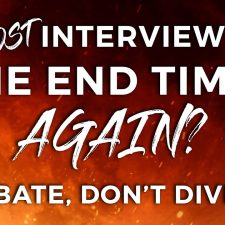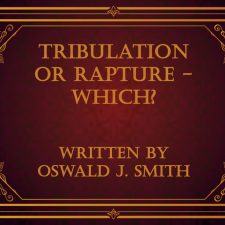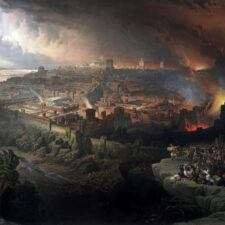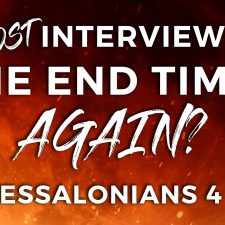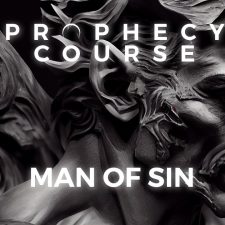[Matthew] Hey, there! I’m Matthew Schoenherr, this is Levaire, and today you’re in for a treat. Our guest is the author of “The End Times, Again? 2000 Years of the Use & Misuse of Biblical Prophecy.” Martyn Whittock is a Licensed Lay Minister in the Church of England and was a high school teacher of history and religious studies for 35 years. Martyn is a historian who has authored/co-authored fifty-four books. As a commentator and columnist, he has written for a number of news platforms and has been interviewed on radio shows exploring the intersection of faith and politics. He has been a consultant for the BBC, English Heritage and the National Trust. He has just completed ‘Apocalyptic Politics’ (releasing later this year) which examines apocalyptic beliefs driving radicalization, including in Russia. Today, he is joining us from his home near Bath, UK.
Welcome, Martyn.
[Martyn] Great to be with you.
[Matthew] Martyn, I would like to take a moment for our audience to get to know you a little bit before we jump into your book. If you could, if you would, tell us a little about your walk with the Lord. What drew you to studying eschatology (the study of last things) and how have you seen your understanding change over time?
[Martyn] Well, I was raised in an evangelical household here in the UK, with a great love of the Bible and also a very real interest in prophecy.
In the 1970s, which were my teenage years, I became deeply focused, as a lot of people did at the time, on end times thinking of the kind found in The Late Great Planet Earth which people of a certain age will be familiar with.
Then in my university studies where I was reading politics at University of Bristol, I came across 17th century groups saying similar things to what I was saying, and getting it wrong in the 17th century. And it rather opened my eyes and made me think, “Oh, we’ve been here before. What should I take from this?”
So that caused me to pause really. I kept up a continuing interest in Christian millenarianism during my teaching career. And in one part of that, I co-wrote, “Christ: The First Two Thousand Years” and another book called “When God Was King.”
In the first one I came across again 17th-century millenarians who were saying very extreme end times things in the 17th century and 16th century.
Then the latter book “When God Was King,” I was actually looking at the British Civil Wars in the 17th century, when people were trying to create a theocracy here, and were convinced that Christ was returning very, very soon. I came across the same sort of people there. And that really gave me a lot of course to think about this, to reflect upon this, to feel a little bit concerned perhaps that over this period of time, Christians had repeated themselves again and again.
I came across it in other areas too. I guess I landed a position now where all of this has caused me to advise caution with regard to end times study.
So I believe in the second coming of Christ, absolutely. But I also believe the Church has got it wrong again and again, and we have to be very cautious and very careful. That’s kind of where I’m coming from.
End Times, Again?
[Matthew] Yeah, it sounds like wisdom to me. Thank you for that. Let’s jump into “End Times, Again?” Martyn, I was delighted as I began to read your book because you seemed to be placing your finger on the pulse of a problem that I’ve been seeing in the Church for years now and that is this kind of end-times madness that overtakes us. (I would say it happens every decade, but these days it seems more frequent than that.) You say in your book that it isn’t intended to be an exposé but more of a study to understand our end-times fascination. What drove you to write “The End Times, Again?”
[Martyn] Well, partly it was that background information I referred to earlier on, that background realization that this had been done again and again and again in Church history, the Church got it wrong again and again.
As I looked that information, that evidence, I began to think, “This should give us course for concern.” But for me, the trigger event occurred in 2016. When I saw end times beliefs deployed (I strongly felt, misused,) in the UK’s referendum on membership of the European Union, the infamous Brexit, in attacks on the EU.
Then in the period of the Trump presidency, when I saw a particular approach to prophecy, and the Middle East, among many of my fellow evangelicals in the USA, influencing policy in a way that concerned me.
This was then followed by responses to the COVID-19 pandemic and climate change that also attempted to frame these approaches in end times terms, that I feel range from highly questionable to wrong, however sincerely done.
[Matthew] 2,000 years of human history is a long time. As you’ve studied that time period, have there been any constant themes you’ve seen in our end-times error? Any differences? Anything that has surprised you?
[Martyn] Well, there certainly have been constants. Basically, any catastrophic current event tends to be viewed as an end-time significance. From my studies, it would be the Magyars, and the Vikings in the 10th century, the Crusades, the Black Death, bubonic plague on this side of the Atlantic and elsewhere, the turbulent Reformation, the British Civil Wars, the Puritan settlement of America, Napoleon. We’ve seen it in the COVID 19 pandemic and the invasion of Ukraine. For example, Pat Robertson last month, bringing out, revising and redeploying predictions regarding Russia that failed in 1980s and 1990s.
Differences: Though the shift to the political right is a clear 20th and 21st century phenomenon, largely due to the way end times beliefs were approached during the Cold War I think. That’s not unique, but in the past, end times beliefs often were more socially radical.
Surprises: It’s that despite a track record over 2,000 years of mistakes, fellow believers rarely admit errors, they revise and repeat the same views, and spend such a lot of time on end time speculation, regardless of scripture warnings not to do so in for example Matthew and Acts.
[Matthew] Okay, so Martyn, what is our problem!? Why does the Church consistently get end-times speculation wrong (well, up to now anyway)? How can we avoid this seemingly endless error?
[Martyn] Why does it happen? Well, primarily I think because we ignore those scriptural warnings. We just find it too tempting to try to speculate about the day and the hour.
But also, I think there’s a tendency to quarry scripture, bolt together versus in order to construct timetables, not paying sufficient attention to their genre, their context of writing and questions of whether a literal, allegorical or pictorial message is being studied.
How might we avoid it? Just some suggestions. One is pretty obvious.
- Spend more time on kingdom building and less on end time speculation.
- Be more sensitive to the context and genre of scripture. Revelation is a key example of this.
- Don’t assume that just because something is a big issue now it must have end time significance. The 14th century Black Death, when somewhere in the region of 30% plus of the European population died was a very big issue. People at the time thought it was the end of the world. It wasn’t.
- And also, if it leads to political and social outcomes that clash with gospel principle alarm bells should be ringing. Prophetic fulfillment is no excuse for behaving in a way that clashes with New Testament teaching. Sounds obvious, but look at the history.
When Will the Rapture Happen?
[Matthew] Let’s take a moment to touch on a favorite end-times topic: the rapture. On YouTube, I’ve seen videos of people melting down over dreams telling them the rapture will be next week, next month–“soon”–what have you. These believers are so sincere! They are terrified for their unsaved loved ones. They’re exhilarated at their special download from the Lord and the nearness of His return! And, of course, those videos are now years old. You are not convinced by the doctrine of the rapture. Tell us why not. How do you believe our understanding of the rapture impacts our behavior regarding the end times?
[Martyn] Okay, the most frequent defense of the idea of the pre- or mid-tribulation rapture is claim to be in a number of key passages.
For example, 1 Thessalonians 4:17 which reads, “Then we who are alive were left will be caught up in the clouds together with them to meet the Lord in the air.” The key is the Greek harpazo, meaning to snatch or catch away. It’s this word that is now well known in its Latin form, raptus or rapture.
Then in 1 Corinthians 15:51, it states, “Listen I will tell you a mystery. We will not all die, but we will all be changed.” This belief is claimed is also revealed in a verse that reads, “The blessed hope and the manifestation of the glory of our great God and Savior Jesus Christ,” in Titus 2:13.
The rapture belief would state that it’s a hope because believers will not face the coming tribulation. Within this verse, it sometimes said that two stages are implied. Firstly, the blessed hope, the rapture, and secondly, the manifestation of the glory of Christ, the actual Second Coming.
Finally, words of Jesus in Matthew 24:39 to 41, regarding two in a field, one taken, the other left. “And two were women grinding flour, one taken and one left.”
Now there are other verses too, but these are core ones. I would argue that these do not support the rapture belief as it is now preached.
1 Thessalonians 4:17 simply assures living believers that they will be united with Christ and the Christian dead on Christ’s return. There’s nothing about it to suggest it’ll be taking place significantly before the Second Coming.
Furthermore, it seems clear that the image of meeting the Lord in the air is drawn from the custom that when a dignitary visited a city, representatives will go out to greet them and lead them back into the city. Consequently, here the Lord comes to the earth and its Christian citizens go out, which in this instance is upwards due to where the Lord is coming from, to greet Him and welcome Him. There’s no need to read this as implying being taken away while life carries on back on the earth. And certainly nothing to suggest this event significantly precedes His Second Coming.
1 Corinthians refers to the same concept those believers are alive when Christ returns, entering glory, thus experiencing death.
The two-staged interpretation of Titus is just not convincing. It imposes an artificial construct on the verse.
Perhaps most telling though is Matthew 24:39 to 41. If you read it in context, the comparison is with the judgment of Noah’s day when those who are not saved in the ark knew nothing until the flood came and swept them all away. The key point is that those who are taken at the coming of the Son of Man, are those swept away by the final judgment. Those who are left are those who survived the judgment like Noah and those with him. The text is very clear about that. This is the exact opposite of the rapture interpretation.
So my feeling is the overall rapture concept can be argued to be a questionable product of attempts to both timetable the end times and gain assurance that believers are exempt from the suffering preceding the return of Jesus.
But it’s now mainstream and hugely influential. And almost nobody before the mid-19th century believed in it.
The problem for me is–apart from poor use of scripture, which should worry Bible-believing Christians–is that it tends to encourage passivity. It suggests that things will get very bad but we won’t be here when it happens.
Also, it’s misleading as a clear message of scripture is that we will be here on earth until Christ’s return.
And so we should be engaging with the issues of the day, and we must recognize that what will happen to the earth will impact on us, in the here and the now.
[Matthew] So it’s safe to say, you’re not pre-trib?
[Martyn] That is safe to say that. Or mid-trib.
[Matthew] Or mid-trib or pre-wrath.
[Martyn] Indeed, there will be a great time of great upheaval, tribulation, crisis, and then Christ will return. But in that time, I believe Christians will still be present, witnessing and doing their best for Him and then He will return. That I think is a clear message of scripture.
[Matthew] Yep, and I agree. I am also on the post tribulation side of that argument, for sure.
[Martyn] Yeah, yeah. I’m a post tribulation rapture believer. I believe in the rapture but post-tribulation, at His Coming.
Who is the Antichrist?
[Matthew] Nice. Here’s another one for you: In “End Times, Again?”, you raise some key issues about the way we Christians understand this dark, foreboding figure known as “Antichrist.” What might we be missing?
[Martyn] Well, the actual term antichrist, usually uncapitalized, is found in the New Testament five times, in the letters known as 1 John and 2 John; once in plural form interestingly and four times in the singular.
The wording of these particular references is such that they’re often interpreted as marking out a certain category of person rather than, or maybe as well as, an individual.
Later belief in an individual antichrist figure also focuses on the letter known as 2 Thessalonians, and here the term antichrist is not actually used. The terms found here are “the lawless one” and “the one destined for destruction,” (2 Thessalonians 2:3) and again, “the lawless one,” (2 Thessalonians 2:8.)
The later conflation of this person with Antichrist and often with a fourth beast of Daniel 7 is understandable given that in 2 Thessalonians 2:4, he is described as “one who opposes and exalts himself above every so-called god or object of worship so that he takes his seat in the temple of God declaring himself to be God.”
Then the composite figure of the singular Antichrist has been, and is often also, combined by Christian writers, in the past and today, with figures found in the book of Revelation, such as one of the beasts of Revelation 13 and of course, the enigmatic mark of the beast, which represents its name is given in Revelations 13:18 as 666, 6-6-6.
And the composite nature in later Christian writings of this evil figure will be defeated by Christ is such that the ideas of Antichrist, the blasphemous beasts, the number 666 have become inextricably mixed.
However, if we’re going to be strict Bible scholars, we have to say that, in the new Testament, the actual matter is much more complex.
It’s far from clear whether these distinct figures were regarded as being aspects of one, end times enemy of Christ and His elect. And yet we talk of this composite figure now as if scripture presented that figure concisely and as one figure. It doesn’t.
[Matthew] Yeah, I’ve heard people weave it into, weave the anti-Christ imagery into things like Daniel’s 70-week prophecy and, well, how did he get in there? How did we end up with this?
[Martyn] Exactly. We end up with the quarrying of scripture in order to reinforce and create timetables which themselves are highly dubious and associations which I think are highly questionable.
[Matthew] For sure. So you don’t believe that there is one Antichrist set in the future; this anti-Christ could have been a single person in the past. Could have been, and is, you know, to some degree, we see this explained in scripture, where it is a mindset, it’s a heart position that exalts itself against God. Is that right?
[Martyn] Indeed and yet there may well be somebody who in the future represents all of this in a particularly intense way. So I believe in antichrists. And of course that is a phrase that’s used in John because I believe that this mindset, this kind of person has been present, as you say, in the past, in the present and may be in the future in a particularly intense way but simply creating a composite figure and saying there he is, as you find, for example in a number of writings, is I think a misreading of scripture.
National Israel vs Spiritual Israel
[Matthew] Well, we can’t talk about last days without getting clear on Israel. Martyn, can you talk about where Israel fits into our end-times understanding? National Israel versus spiritual Israel; where do you fall?
[Martyn] With regard to national Israel versus spiritual Israel, this is hugely controversial. My personal belief is that, what Paul calls the Israel of God, Galatians 6:16, refers to believers, Jews and Gentiles who accept Jesus as the Messiah. In short, the Church.
From the late Roman empire, until fairly recently, most Christians accepted a version of this view often termed supersessionism or replacement theology. This was tragically often associated with appalling antisemitism which is not an inevitable outcome of thinking that the Church has inherited the role of Israel on the promises. But was often associated with that view and that is terrible.
However, I think that supersessionism or replacement theology misses the point that in Romans and elsewhere, it seems clear that God has not abandoned a particular and special relationship with the Jewish people.
So having said that, I think that the multiracial, multiethnic Church has inherited, by grace, the intimate relationship with God that we see in the Old Testament but that God still has a particular relationship with the Jewish people. He longs to bring them into a relationship with Jesus and they remain part of His wider plans.
I don’t believe in dispensational pre- or mid-tribulation rapture, as I’ve just said earlier. So I don’t think there’ll be a time when the Church will be taken out the equation. And while I cannot explain how it works, I think that this complex relationship of Church and Judaism will continue until Christ’s return.
That brings us to the state of Israel. I believe that the formation of Israel is a fulfillment of prophecy and a remarkable one. And that Israel plays a key role in the last days.
However, A) I don’t think that this means we can assume that 1948 started a clock running, such that we can assume the timing of the Second Coming. And I’ve seen calculations based on 1948 in a number of writings.
B) I think even if a fulfillment of prophecy, (which I think it is) this does not mean that Christians should suspend Gospel principles when relating to Israel and they should not offer unquestioning support prevalent among many Christian Zionists, because this collides with the expectations of the Gospel.
I do not think Christians should offer unquestioning support to any state or any regime. See those who really love Israel will point out when policies and actions are wrong. Remember the Old Testament prophets. Remember Jesus. Huge numbers of modern Christian Zionists seem to have forgotten this.
It sometimes feels to me that Gospel principles get put to one side when some of my fellow evangelicals reflect on Israel. Many Old Testament prophets got into deep trouble because they were critical of contemporary policies while remaining committed to Israel. I think that offers a better model for our relationship with Israel than the one that is often promoted.
[Matthew] So you don’t necessarily subscribe to supporting Israel in every move they make.
[Martyn] No, I wouldn’t support any nation or any state in every move it makes because I’m a Christian. Now that sounds provocative but I don’t mean to be provocative. The point is, the Gospel is such that there’ll be times when you say yes, yes, yes, and times you go, no, no, no, because by definition we can never offer unquestioning support to any state or any regime. The Gospel just won’t allow it.
[Matthew] Right. And I think the Old Testament, just as you pointed out, is a wonderful model for: Look, national Israel wasn’t always walking too well with the Lord, and so we can’t expect that current day national Israel is going to be any different.
[Martyn] Indeed many old Testament prophets would’ve been thrown out of conferences dedicated to support for Israel because they’d have said things that upset people because they were critical somewhere on the line they’d have said, “Thus, saith the Lord,” about some kind of behavior, and they had been booted out. That should give us cause for concern.
[Matthew] Yes. That’s a great point. In your book, you refer to the ‘weaponizing’ of end-times ideology by believers. What do you mean by that?
[Martyn] I’m really concerned about the way in which in my opinion, the end times have become weaponized and politicized in the recent past. For me, this stands out in a number of ways: In the English world, end times beliefs have been used to justify Christian nationalism, in the USA, in the UK. Now in the Orthodox Russia of Vladimir Putin.
In my opinion, we saw this in the UK over Brexit, for example. It also concerns me when people like Franklin Graham, as recently as the fall of 2021, appear to reject climate change action because the end is imminent. If it’s not imminent, then rescuing God’s creation from the effects of fallen humanity would seem an oppressing need. If the end is near, God will, I am sure, want to find us at our posts, caring for His world.
After all, and this is a major point: Just because something is a fulfillment of prophecy, does not mean we should be passive regarding it. We are still responsible for actions regarding circumstances even if they are fulfillments of prophecy.
[Matthew] Yeah, so we don’t stop doing good in the world just because we think Jesus is coming tomorrow.
[Martyn] Indeed, absolutely. And a fulfillment of prophecy may sometimes be something of which God strongly disapproves, and maybe a judgment upon the world. So us going along with it and saying, “Oh, that’s fine; it fulfills prophecy,” could be morally and spiritually deeply problematic.
More Questions About “End Times, Again?”
[Matthew] That’s a great point. If you could go back into history, who’s the one person you wish you could have interviewed for this book?
[Martyn] I would like to have interviewed Oliver Cromwell, the Puritan politician, and the 17th century Republican leader in Britain during the British civil wars. He believed in the imminent return of Jesus, but he clashed with end times literalists of his own time, particularly the Fifth Monarchist movement. I’d like to ask him what he thought and why there were such huge differences between himself and some among his fellow Puritan contemporaries.
In the present time, I would’ve liked to talk to Hal Lindsay of “Late Great Planet Earth” fame, a very influential book in the ’70s, and had a big impact on me at the time. I’ve got big disagreements with him, and as I am a Bible-believing evangelical, I’d like to discuss why our views—given the fact that we both have deep respect for scripture, believe in the Second Coming, believe in the end times—why, despite that common approach, our views on the subject are so different. I would like to share a coffee and have a chat.
[Matthew] That’d be a great conversation. Since you’ve finished the book, is there anything you would have added to it?
[Martyn] More information on the eschatological speculation during the American revolution. I mention it, but I’d like to have said more. It was happening, there were various end-times-related references being made to George III, but I’d like to have delved deeper into that and try to work out what was going on there.
I’d also like to have explored more of similar speculation that was occurring during the Napoleonic Wars. I touch upon it, but not in as much detail as I wish I had.
Also, coming up to date, I mentioned, but I’d like to have explored much further, the way that extreme end times ideology and beliefs in QAnon and similar outlooks tend to be held by this same people. Things that drove the emergence of QAnon were, I think, related to what also drove and is driving the renewed radicalization of end times beliefs. The connection is not surprising, since QAnon represents almost a humanistic millenarian realized eschatology, focused on imminent judgment day which will be followed by a reordering of US society.
In January, 2021, research by the American Enterprise Institute’s Survey Center on American Life found that, of those inclined to believe QAnon, 27% were white evangelical Christians. In short, there is, the study found, “significant overlap between Q followers and evangelicals” quote, unquote. If I were submitting the book now, I’d make much more of exploring this, and trying to work out why.
[Matthew] Okay, so maybe an updated edition coming years down the road.
[Martyn] If I have that opportunity.
[Matthew] What do you think people are going to find controversial about this book?
[Martyn] It’s challenging the belief in the dispensational pre- or mid-tribulation rapture, which is so mainstream now and the challenging of that is controversial. It’s calling for less time to be spent on end times studies and speculation, and more time on kingdom building. And probably my views on the way current end times beliefs are used to support a particular political outlook. I think those are controversial but they’re things that I sincerely feel and I’m concerned about.
[Matthew] Yeah, now, that’s fair. So what’s next for you, man? What are you working on now? And when is the next book coming out?
[Martyn] I’ve recently finished writing a book titled “Apocalyptic Politics”, which looks at the link between end times beliefs and radicalized politics across global cultures and time, not just within Christianity. And this includes in Russia, where extreme end times beliefs within Russian orthodoxy and extreme nationalism, have become entangled. In fact, I had to update that chapter following the Russian invasion of Ukraine. God willing, this book should be out in the late summer.
[Matthew] Nice. Love it. Martyn where can people buy “End Times, Again?” and how do they get on your mailing list?
[Martyn] They can get it from the publisher Wipf and Stock of Eugene, Oregon; online book sellers (for example, Amazon, but there are many others); and any local bookstore can order it. So support your local bookstore as well.
I’m on LinkedIn, and I can also be found on Twitter, where I am @MartynHistorian.
[Matthew] Nice, thank you, Martyn. It was a pleasure speaking with you today. I truly appreciate the careful way you handle our Father’s Word and I know that the Levaire viewers and readers will too. I will be adding a link to your book in this article and in the video description.
[Martyn] Many thanks, that’s very much appreciated. My hope, my sincere hope and prayer, is that the book would encourage a conversation with fellow evangelical Christians about this extremely important issue. Even when we disagree, I think it’s good to discuss why we think as we do based on our exploration of scripture.
[Matthew] All right, folks, that’s a wrap. The book is “The End Times, Again? 2000 years of the use and misuse of biblical prophecy,” the author and our guest today was Martyn Whittock. If you love the Word and you want to better understand end times prophecy you want this book.
Remember: it is the truth that sets you free.



